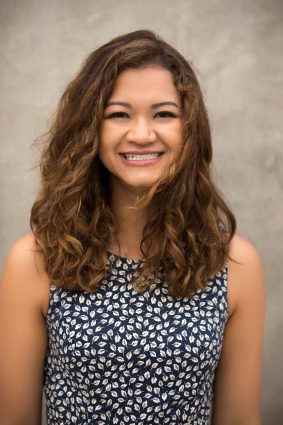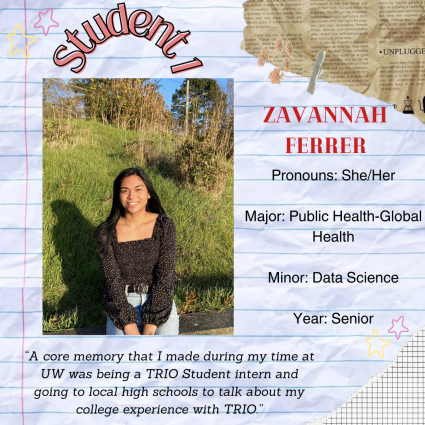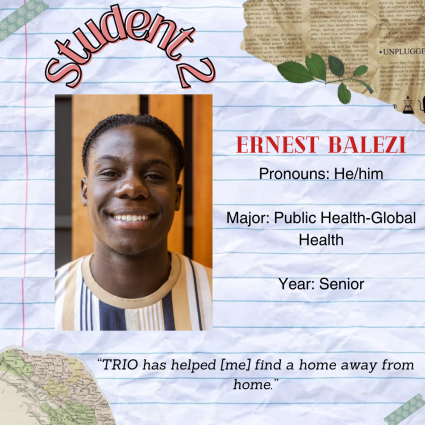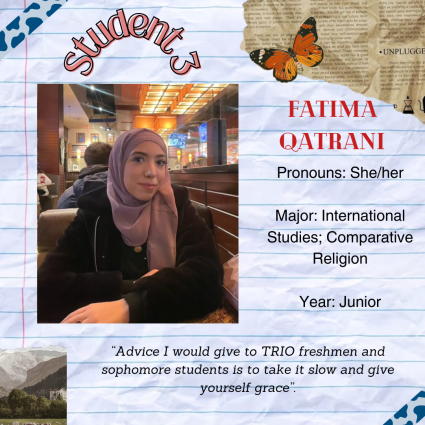Student Highlight
Happy National TRIO Day 2024!
Celebrating the 38th National TRIO Day by spotlighting three amazing UW TRIO students! See more about their story on our Instagram @UWTRIOSSS. Spotlights created by a UW TRIO student peer.
Congratulations to the Graduating Class of 2021!
Check out our TRIO SSS Graduating Class of 2021 on our Instagram @UWTRIOSSS every Monday, Wednesday & Friday for a Senior Highlight!

Our TRIO SSS Team is incredibly proud and honored to celebrate our 2021 Graduates! Check out our TRIO SSS graduates along side their fellow Office of Minority Affairs & Diversity (OMA&D) Class of 2021 here!

TRIO Alumni Highlight: Sarah Keo
Sarah Keo is a TRIO Alumni sharing her story as a first-generation student navigating UW and the impact that TRIO had on her academic career. Check out her story below!

When I was a kid, there was nothing that I wanted more than to be normal. Growing up in a predominantly white, middle-class suburb, my idea of “normal” was having the quintessential, all-American nuclear family – a replica of the white picket-fenced American Dream. Unfortunately for me, as a Cambodian-American with refugee parents, that fantasy was far beyond my reach.
Both of my parents escaped the Khmer Rouge, the communist regime responsible for the genocide of over 2 million Cambodians during the late 1970s, and found asylum in North America, where they struggled to make a life for themselves. My parents tried their best to raise us kids, but they suffered an immense amount of pain and trauma that they carried with them through their adult lives, leading them down a spiral of alcoholism and depression. As a child, I was the product of a broken home with no money and little parental guidance. I was horribly awkward in school, felt uncomfortable in my own skin, and was bullied for looking different. Any hope for normalcy that I had was doomed from the start.
Under these living conditions, I quickly learned how to take care of myself and so did my brothers. After my parents divorced, my mom was a single mother working two jobs, so we were responsible for getting ourselves on the school bus every morning and doing our homework in the evenings. Unfortunately, when your first priority is to survive your day-to-day, education becomes a secondary thought. And the awful thing about trauma is that it passes down through generations, so over the years my brothers struggled through their own cycles of alcoholism, mental illness, and childhood trauma.
According to the Pew Research Center, 59% of Cambodian-Americans have a high school education or less, 24% have some college education, and only 18% have a Bachelor’s degree or higher. If there were ever a real-life case study to back these statistics, it’d be my family: my eldest brother dropped out of high school; the second eldest got his high school diploma; and the third eventually got his associate’s degree. Fortunately, I was removed from my parents’ custody at the age of 10 and was taken in by my aunt. She provided me with a loving home, and for the first time in my life the idea of attending university and obtaining a 4-year degree felt like a real possibility.
As you can imagine, the moment I opened my acceptance letter to the University of Washington was a dream come true. I was the first person in my family to break the cycle and attend university. With my acceptance, I learned I would be a part of the TRIO Student Support Services (SSS) program for first generation and low-income students. At the time, I had no idea what TRIO was, but if it helped me to go to college, I was game for anything.
Entering the university as a freshman, I was in for a rude awakening; I was a small fish lost in a large sea, and I had no idea what I was doing. Although this is a common feeling among incoming freshmen, I lacked the same support system most other students had and needed guidance. Luckily, TRIO requires their students to visit their advisors at least once a quarter, so I was able to get the help I needed.
The first time I checked in for an advising appointment, I was greeted by the warm, smiling face of my advisor, Ann. The first thing that I noticed about Ann was that she was Vietnamese. I would later learn that Ann’s family also immigrated to America and struggled through their own hardships. When you’ve had mostly white teachers and advisors your entire academic career, there is a level of comfort in having an advisor who not only looks like you, but who also understands the struggles you and your family have endured.
I immediately felt comfortable with Ann, and she became my go-to person for advice. When I needed a work study position, TRIO staff encouraged me to apply for a Student Associate position at the Office of Minority Affairs and Diversity (OMA&D), and I was hired shortly after. TRIO staff set me up for future success by helping me with scholarship applications, writing me recommendations, and guiding me as I chose to major in Marketing through the Michael G. Foster School of Business..
My TRIO adviser helped me make some of the best decisions I’ve made in my life.. If I weren’t in TRIO, I would’ve never studied abroad in India and Tahiti. Later on as a Senior, when I was faced with the mounting pressures from the business school to go the corporate route, Ann encouraged me to pursue my passion for film instead. My TRIO adviser was the person in my corner who made me believe I could accomplish whatever I set my mind to. Six years later, I am now the Production Coordinator at a reputable film production company whose most recent film, The Social Dilemma, reached 38 million households within the first 28 days of its premiere on Netflix. My secret childhood dream was to tell stories and change the world. I have TRIO to thank for helping me to achieve that dream.
It’s difficult to put into words how much TRIO did for me, but I am who I am today because of that program. Working in the OMA&D office and being a part of the TRIO program, I was provided with more than just financial aid and academic advising. I was given a second family among the Advisors and Student Associates who nurtured me and cherished me in a way that I didn’t even know I needed. It was a community of intelligent and thoughtful leaders from all different backgrounds who taught me the importance of diversity and inclusion.
For once in my life, I felt comfortable in my own skin. For once in my life, I was embraced by a community that made me feel like I belonged. For once in my life, I understood that the adversity I faced didn’t define me and that being a woman of color and the child of refugees were things to be proud of. Maybe I didn’t get the white picket fence, but I got the family, albeit unconventional, that I had always wanted.
This is all to say that the TRIO program changed my life. When I first joined TRIO, I was skeptical of another authoritative figure telling me what to do. I was a stubborn and independent 18-year-old who held the misguided belief that I had to navigate college on my own. As silly as it may sound, my TRIO adviser was the first person to ever tell me that it’s okay to ask for help. Without Ann’s help, I would’ve never been able to get through college debt-free, nor would I have landed my dream job of working in film. So to the incoming TRIO students out there: please take advantage of this program. Being a part of the TRIO program was one of the best things to ever happen to me, and if you open yourself to this program, your life will be changed, too.




